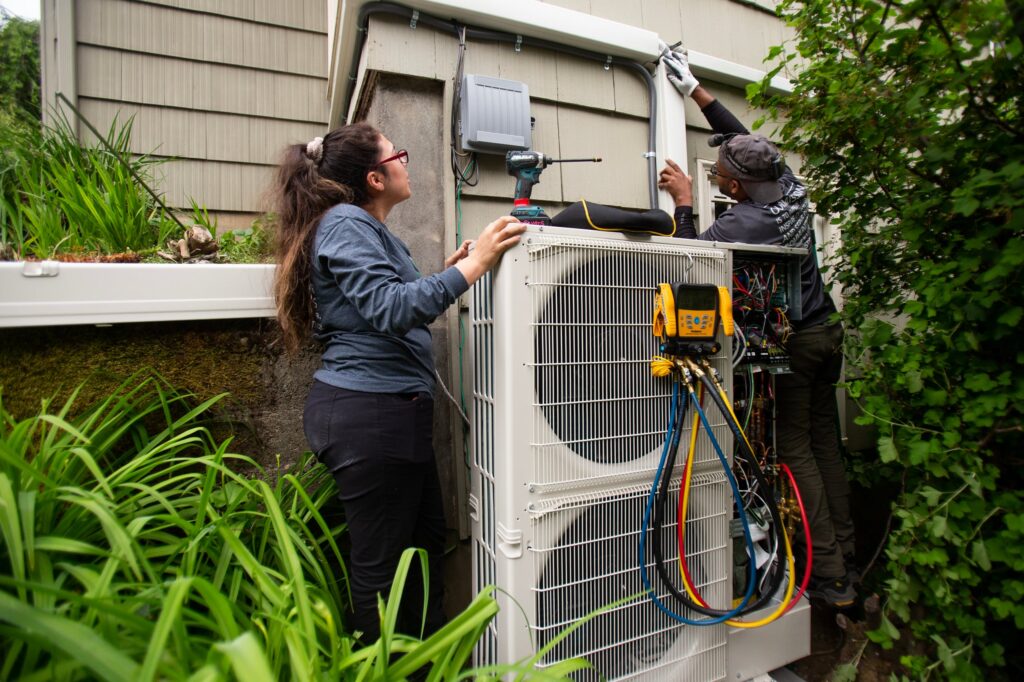With the first stretch of high heat, Portland area residents face a tough reminder: Gone are the days of mild summers when cooling a home was about opening a few windows.
These days, air conditioners or heat pumps are a must-have.
And for those who can’t afford one – whether a portable unit or a whole-house system – there’s help. But time is of essence, and not just because summer is upon us.
Many of the programs may disappear soon due to Trump administration policy changes and state budget cuts.
Portland Clean Energy Fund
Low-income Portland residents
can apply for a heat pump
via Cooling Portland, a city-based heat response program funded by the Clean Energy Fund, the city’s climate fund seeded by a 1% tax on large retailers in Portland.
Launched a year after the deadly 2021 heat dome, which killed 72 people in Multnomah County, Cooling Portland has distributed more than 15,700 portable cooling devices. It met its distribution goal nearly two years ahead of schedule – showing just how great the need is in a city where AC units were once sparse.
The program, which typically has a waitlist, prioritizes people over 60 who live alone and have medical conditions that increase the risk of heat-related illness – characteristics of the people who have died during previous extreme heat events. But anyone who lives in Portland can qualify as long as they meet the income criteria.
Cooling Portland is now working to install an additional 10,000 cooling units by next year, via an additional $10.3 million from the Clean Energy Fund. People can
apply online
or by calling 311. Because demand increases as the weather heats up, the program is encouraging people to apply as soon as possible to increase the chances of receiving a unit this summer.
New state heat pump program
The Oregon Department of Energy is about to launch a
new heat pump program
, funded through a grant from the U.S. Environmental Protection Agency. The $2,000 incentive, available regardless of income, is aimed at homeowners, rental property owners and developers who purchase a heat pump.
The incentive will be issued to approved contractors who install eligible heat pumps in homes and who then pass it on to the homeowners or developers. The state is currently accepting registrations for approved contractors and will begin accepting incentive reservations and applications on June 17.
Funding will be distributed in two rounds, one in 2025 and one in 2027. It will benefit a small number of households, with 12,000 incentives available in total.
The state Energy Department also is still planning to distribute generous incentives via the Inflation Reduction Act, for heat pumps and other electric appliances. But those won’t be available until
late 2025 or early 2026
and will only benefit about 13,000 Oregonians. The state Energy Department is still finalizing the program design and rules.
First-in-the-nation
Last year, the Oregon Health Authority distributed nearly 6,000 air conditioners and 4,000 other devices through two separate programs: a state-funded emergency response initiative and a first-in-the nation climate benefits program.
Recipients were
members of the Oregon Health Plan, the state’s version of Medicaid, which covers lower income Oregonians.
Also distributed: air filters to improve air quality during wildfires, mini fridges to keep medications cold during heat waves and portable power supplies to run ventilators and other medical devices in the event of power outages.
The state-funded AC program is now out of money and
is no longer accepting new applications
. The federally-funded program – part of a
Biden-era strategy
to expand
benefits known as health-related social needs
, using Medicaid funds to cover everything from rent assistance to healthy food to cooling equipment – is also at risk of closing. The Trump administration
rescinded guidance on the program
earlier this year and may roll it back as part of the cuts proposed for Medicaid.
For now, Oregon Health Plan members who have a health condition that gets worse during hot weather or due to poor air quality and who are undergoing a life transition
can still apply
for an AC unit, air filter or other device through the federally-funded program via their coordinated care organizations.
Also out of funding
Two existing state-funded heat pump distribution programs, created by the Legislature after the 2021 heat wave, also are out of money. Both provided up to $7,000 for the purchase and installation of a heat pump – but they won’t accept applications or issue rebates unless the Legislature decides to extend them and allocate additional program funding (which it has not done thus far).
The
Rental Home Heat Pump Program
, which supported heat pump installations in Oregon rental housing, prioritizes low- and moderate-income rental properties and affordable housing sites and has already issued rebates for nearly 3,000 projects. It’s seeking an additional $30 million in funding.
And the
Community Heat Pump Deployment Program
, which provided financial assistance to homeowners toward the purchase and installation of heat pumps, is seeking an additional $15 million. The program was especially successful in central and south-central Oregon.
It’s still possible that the final state budget bill, to be released later this month, might include some money for the heat pump programs.
Tax credits while they last
And there’s still time to apply for a 30% federal tax credit – available to everyone regardless of income – for energy-efficient home improvements, including heat pumps before the Trump administration does away with it. A tax credit is an amount people can deduct from their tax returns to reduce the income tax they owe, so low-income people don’t benefit from those.
People can get up to a $2,000 tax credit for a heat pump or a heat-pump water heater. But those tax credits are currently on the cutting board. The federal tax-cut and spending bill that House Republicans passed in May would eliminate consumer clean energy incentives, including those for heat pumps, at the end of December. The bill, dubbed “One Big Beautiful Bill Act,” still needs to pass the Senate.
Households also can receive financial incentives from
the Energy Trust of Oregon
and local utility companies. The amounts — typically ranging from $500 to $1,000 — depend on a resident’s income, what heating source they’re switching from and whether they are a homeowner or a landlord. The highest Energy Trust incentives of $4,000 are available for people living in manufactured homes heated by electric forced air.
Stories by
Gosia Wozniacka
-
Power shutoffs banned during extreme summer heat in Oregon
-
Oregon expands ban on plastic bags to curb pollution
-
Portland eliminates most fees under maligned Portland tree code starting in July
-
Oregon senator fights Trump administration’s reversal on plastics in national parks
— Gosia Wozniacka covers environmental justice, climate change, the clean energy transition and other environmental issues. Reach her at gwozniacka@oregonian.com or 971-421-3154.





More Stories
First hot spell of summer — do you know where to get help to cool your home?
First hot spell of summer — do you know where to get help to cool your home?
First hot spell of summer — do you know where to get help to cool your home?